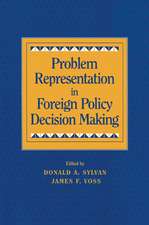The Role of Governments in Legislative Agenda Setting: Routledge/ECPR Studies in European Political Science
Editat de Bjorn Erik Rasch, George Tsebelisen Limba Engleză Paperback – 26 noi 2015
With a strong comparative framework, this coherent volume examines fourteen countries and provides a detailed investigation into the mechanisms by which governments in different countries determine the agendas of their corresponding parliaments. It explores the three different ways that governments can shape legislative outcomes: institutional, partisan and positional, to make an important contribution to legislative politics.
It will be of interest to students and scholars of comparative politics, legislative studies/parliamentary research, governments/coalition politics, political economy, and policy studies.
| Toate formatele și edițiile | Preț | Express |
|---|---|---|
| Paperback (1) | 416.22 lei 6-8 săpt. | |
| Taylor & Francis – 26 noi 2015 | 416.22 lei 6-8 săpt. | |
| Hardback (1) | 1064.01 lei 6-8 săpt. | |
| Taylor & Francis – 8 noi 2010 | 1064.01 lei 6-8 săpt. |
Din seria Routledge/ECPR Studies in European Political Science
- 15%
 Preț: 396.41 lei
Preț: 396.41 lei -
 Preț: 416.96 lei
Preț: 416.96 lei - 18%
 Preț: 1060.52 lei
Preț: 1060.52 lei - 49%
 Preț: 545.76 lei
Preț: 545.76 lei - 18%
 Preț: 1115.33 lei
Preț: 1115.33 lei - 15%
 Preț: 240.30 lei
Preț: 240.30 lei - 18%
 Preț: 1002.63 lei
Preț: 1002.63 lei - 18%
 Preț: 1002.50 lei
Preț: 1002.50 lei - 18%
 Preț: 1111.55 lei
Preț: 1111.55 lei - 12%
 Preț: 303.01 lei
Preț: 303.01 lei - 18%
 Preț: 1118.46 lei
Preț: 1118.46 lei -
 Preț: 416.26 lei
Preț: 416.26 lei - 18%
 Preț: 1002.99 lei
Preț: 1002.99 lei - 18%
 Preț: 733.11 lei
Preț: 733.11 lei - 18%
 Preț: 1005.34 lei
Preț: 1005.34 lei - 18%
 Preț: 1112.34 lei
Preț: 1112.34 lei - 18%
 Preț: 1064.01 lei
Preț: 1064.01 lei - 18%
 Preț: 1117.43 lei
Preț: 1117.43 lei -
 Preț: 310.83 lei
Preț: 310.83 lei - 28%
 Preț: 824.17 lei
Preț: 824.17 lei - 18%
 Preț: 1112.53 lei
Preț: 1112.53 lei - 18%
 Preț: 1057.75 lei
Preț: 1057.75 lei - 25%
 Preț: 711.92 lei
Preț: 711.92 lei -
 Preț: 287.41 lei
Preț: 287.41 lei - 18%
 Preț: 1009.55 lei
Preț: 1009.55 lei - 18%
 Preț: 1002.50 lei
Preț: 1002.50 lei -
 Preț: 199.65 lei
Preț: 199.65 lei - 18%
 Preț: 1004.20 lei
Preț: 1004.20 lei -
 Preț: 413.94 lei
Preț: 413.94 lei - 26%
 Preț: 765.84 lei
Preț: 765.84 lei - 18%
 Preț: 1116.38 lei
Preț: 1116.38 lei - 18%
 Preț: 1060.87 lei
Preț: 1060.87 lei - 26%
 Preț: 765.43 lei
Preț: 765.43 lei - 18%
 Preț: 1058.65 lei
Preț: 1058.65 lei - 18%
 Preț: 1058.38 lei
Preț: 1058.38 lei - 49%
 Preț: 546.84 lei
Preț: 546.84 lei - 18%
 Preț: 1108.42 lei
Preț: 1108.42 lei - 18%
 Preț: 1113.12 lei
Preț: 1113.12 lei - 28%
 Preț: 823.63 lei
Preț: 823.63 lei - 18%
 Preț: 1001.70 lei
Preț: 1001.70 lei -
 Preț: 392.24 lei
Preț: 392.24 lei - 18%
 Preț: 1002.63 lei
Preț: 1002.63 lei - 28%
 Preț: 824.53 lei
Preț: 824.53 lei - 18%
 Preț: 1112.34 lei
Preț: 1112.34 lei - 9%
 Preț: 935.80 lei
Preț: 935.80 lei - 22%
 Preț: 478.91 lei
Preț: 478.91 lei -
 Preț: 487.37 lei
Preț: 487.37 lei
Preț: 416.22 lei
Nou
Puncte Express: 624
Preț estimativ în valută:
79.64€ • 83.38$ • 65.90£
79.64€ • 83.38$ • 65.90£
Carte tipărită la comandă
Livrare economică 07-21 aprilie
Preluare comenzi: 021 569.72.76
Specificații
ISBN-13: 9781138989870
ISBN-10: 1138989878
Pagini: 304
Ilustrații: 42
Dimensiuni: 156 x 234 x 16 mm
Greutate: 0.45 kg
Ediția:1
Editura: Taylor & Francis
Colecția Routledge
Seria Routledge/ECPR Studies in European Political Science
Locul publicării:Oxford, United Kingdom
ISBN-10: 1138989878
Pagini: 304
Ilustrații: 42
Dimensiuni: 156 x 234 x 16 mm
Greutate: 0.45 kg
Ediția:1
Editura: Taylor & Francis
Colecția Routledge
Seria Routledge/ECPR Studies in European Political Science
Locul publicării:Oxford, United Kingdom
Public țintă
Postgraduate and UndergraduateCuprins
1. Governments and Legislative Agenda Setting: An Introduction George Tsebelis and Bjørn Erik Rasch 2. Germany: Limited Government Agenda Control and Strong Minority Rights Christoph Hönnige and Ulrich Sieberer 3. France: Systematic Institutional Advantage of Government Sylvain Brouard 4. Italy: Government Alternation and Legislative Agenda Setting Francesco Zucchini 5. United Kingdom: Extreme Dominance by the Executive... Most of the Time Mads Qvortrup 6. Hungary: Changing Government Advantages―Challenging a Dominant Executive Gabriella Ilonszki and Krisztina Jáger 7. Netherlands: Legislative Agenda Setting and the Politics of Strategic Lock-Ins Arco Timmermans 8. Switzerland: Agenda-Setting Power of Government in a Separation-of-Powers Framework Daniel Schwarz, André Bächtiger and Georg Lutz 9. Greece: Government as the Dominant Player Aris Alexopoulos 10 Spain: Majoritarian Choices, Disciplined Party Government and Compliant Legislature Natalia Ajenjo and Ignatio Molina 11. Portugal: Active and Influential Parliament Eugenia da Conceição-Heldt 12. Russia: The Executive in a Leading Role Iulia Shevchenko and Grigorii Golosov 13. Agenda Control and Veto Rights to Opposition Parties Robert Klemmensen 14. Norway: Institutionally Weak Governments and Parliamentary Voting on Bills Bjørn Erik Rasch 15. Japan: Decades of Partisan Advantages Impending Cabinet’s Agenda Setting Power Silke Riemann 16.Conclusion Bjørn Erik Rasch and George Tsebelis
Descriere
With a strong comparative framework, this book examines fourteen countries with parliamentary or semi-presidential systems of government to provide a detailed investigation into the mechanisms by which governments determine the agendas of their parliaments.


















![Security Arabic [With MP3]: Britain's War in Northern Ireland](https://i1.books-express.ro/bt/9780748646616/security-arabic-with-mp3.jpg)
